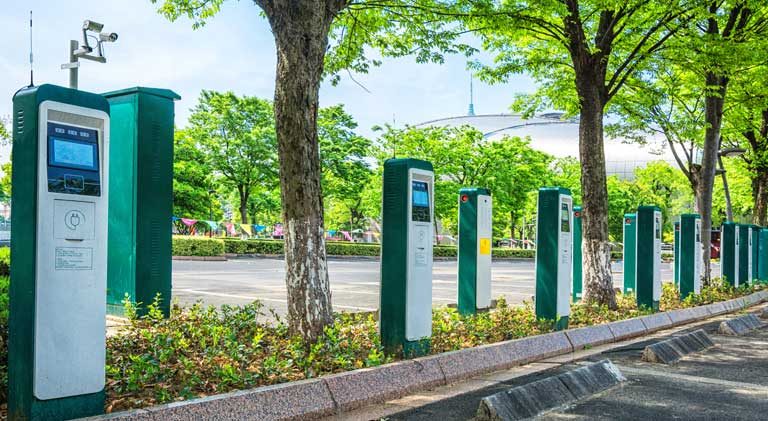The Electric Vehicle (EV) market is booming. As more and more consumers and businesses take advantage of the technology, unit sales are increasing with figures for vehicles and the charging infrastructure required growing exponentially. IoT cellular connectivity is now playing a key role in bringing the EV eco-system to life.
Bringing EV charging to life with secure cellular connectivity
The increasing figures of EVs means one thing – the need for the right amount of charging stations – whether at home, at work or in publicly accessible areas for on-the-go electric top-up. The growing network of charging points is being provided by a number of providers and software platform developers, all driving to create global standards, highly efficient delivery solutions and loyalty programmes to ensure repeat visits. In turn, the networks need to be connected – enabling operators to monitor performance and maintenance of the hardware together with the monetisation of the charge points with automated billing and usage management. In many cases, operators are turning to the flexibility, security and cost-effectiveness of cellular IoT connectivity – enabling secure communication with a dedicated 4G SIM for the charging point.

The EV eco-system demands reliability - from its infrastructure and its communication platforms

For EV charge point operators (CPO’s), the rapid deployment of new installations comes with its own challenges – planning constraints, ease of access, and on a technical level, the need for secure two-way connectivity.
The importance of reliable connectivity for each charge point can not be underestimated. From managing, maintaining and monitoring charging points to automated billing for end users, charge points need to communicate in real-time, at all times. Just as a consumer would not expect a petrol station to run out of fuel, EV users expect a charge point to be in operation at all times, automatically recognising the user via systems such as Automated Number Plate Recognition (ANPR), and generating accurate usage and billing data. In an increasingly competitive landscape, a good charging experience will generate brand loyalty and repeat visits. Confidence in the reliability of a charge point estate is therefore key.
The widest range of SIM-based connectivity solutions for an EV charging deployment
Wireless Logic can access every major European network to shape tailored tariffs and contracts tailored to each individual use case. Importantly, mobile connectivity deployment is rapid. It enables charge point operators to connect their charging assets at a time to suit them, with SIM installation either at point of manufacture or out in the field. Connectivity choice for charging operators is also vitally important.
One SIM fits all – the ideal solution for widely deployed charging assets
Whilst a full range of UK and European local networks is available, many deployments are turning to Wireless Logic’s non-steered roaming SIM solution. Non-steered implies that the SIM will connect to the strongest signal and bandwidth available, without any preloaded bias to a primary mobile network. This gives OEMs and operators the ability to connect entire charging estates with just one SIM… not multiple SIMs to suit each local location. And with competitive rates for data, this SIM option is proving effective for low and higher data requirements.

Maintaining control of your SIM-based assets

Control is critical to the effective operation of SIM-based charging assets in the field. Wireless Logic’s SIM management platform ‘SIMPro’ gives users complete visibility and control of SIMs, with one window to multiple networks. The platform reports on usage, performance and cost management, whilst also being able to alert on data overage – all important when running multiple connected solutions with variable usage across an entire estate.
Pooling of data is becoming more popular where users can spread their data usage across a group of SIMs – in this way keeping control of data consumption through high and low use cases. SIMPro also features tiered levels of access which enables charging point operators to give operational staff varying privileges when accessing the platform.
Securing your EV-related data
Security of mission-critical data is achieved by locking down mission-critical data away from the public networks within MNOs. Using fixed private IP’s on each SIM, Wireless Logic’s secure overlay infrastructure enable charging point operators to communicate two-way with each SIM-based asset, with a range of security protocols available.
The secure VPN solutions available from Wireless Logic comply with Open Charge Point Protocol (OCPP) 1.6 & 2.0. Wireless Logic’s ready-made infrastructure removes the need for customers to purchase their own private network support solutions which can be prohibitively expensive and take time to install.


Connect, Control & Secure your Electric Vehicle (EV) Charge Point project with Cellular IoT Connectivity.
EV Charge Point Operators (CPOs) and OEMs who provide AC/DC charge points, need to provide a fast and reliable charging experience to meet the ever-growing demand of the EV market, all controlled in a managed and cost-effective way.
This webinar will explain the key challenges CPOs face when it comes to connecting multiple and remote EV Charge Points and the role that cellular connectivity is playing to support the increasing demand. You’ll be taken through a step-by-step process by one of our IoT experts and hear from Plug-N-Go about how they’ve been able to provide their customers with an ‘always on’ connected EV Charge Point solution across the UK.
When you access this webinar, you’ll also receive a free download of our exclusive booklet.
Working with EV platforms like Fortum
Whilst still in its relative infancy, sector standards are now coming to the fore with common operator software platforms such as Fortum’s Charge & Drive platform. Across the Fortum global SaaS platform, sessions handled on a month by month basis already number in excess of 250,000 from thousands of connected chargers with solutions for both network management and end-user billing.
Several of Fortum’s customers use Wireless Logic Group for their 4G connectivity requirements using best-in-class communication with a secure 4G non-steered roaming SIM for each deployed charging asset. With the growing network of charging units, users of the Fortum platform have highlighted the need to have a multiple Mobile Network solution so that each location can automatically connect to the strongest signal. Not limited to a single country network, Wireless Logic’s single SIM solution delivers pan-European coverage with no bias towards any given Mobile Network.
Security is provided by Wireless Logic’s secure mobile network overlay, delivering VPN connectivity with end-to-end encryption. Throughout the testing and integration stages, technical teams from Fortum have monitored the effectiveness and integrity of the 4G solution with a drive to ensure suitability in line with Open Charge Point Protocol 1.6 and 2.0. Importantly, Fortum has approved the secure overlay infrastructure as appropriate to the new open standards.
With the EV eco-system requiring varying levels of mobile data usage – low thresholds for charging points and higher thresholds for ANPR applications, the need to monitor and control SIM activity is critical. Wireless Logic’s SIM management platform enables charger operators to have complete visibility and control of connected assets – provisioning deployments, managing data usage and organising billing points. With an increasing number of chargers – across Europe, it is vital that connectivity is effectively controlled.
As more charging point operators come to market, the sector is in safe hands as secure connectivity paves the way for the growing number of deployments requiring rapid and flexible cellular communications, wherever they are located.
Your next step…
For more information on 4G connectivity for the EV Sector,
talk to our specialist Transport & Logistics team about your connectivity needs
Call us on 0330 056 3300
See some of our Transport and Logistics case studies…


